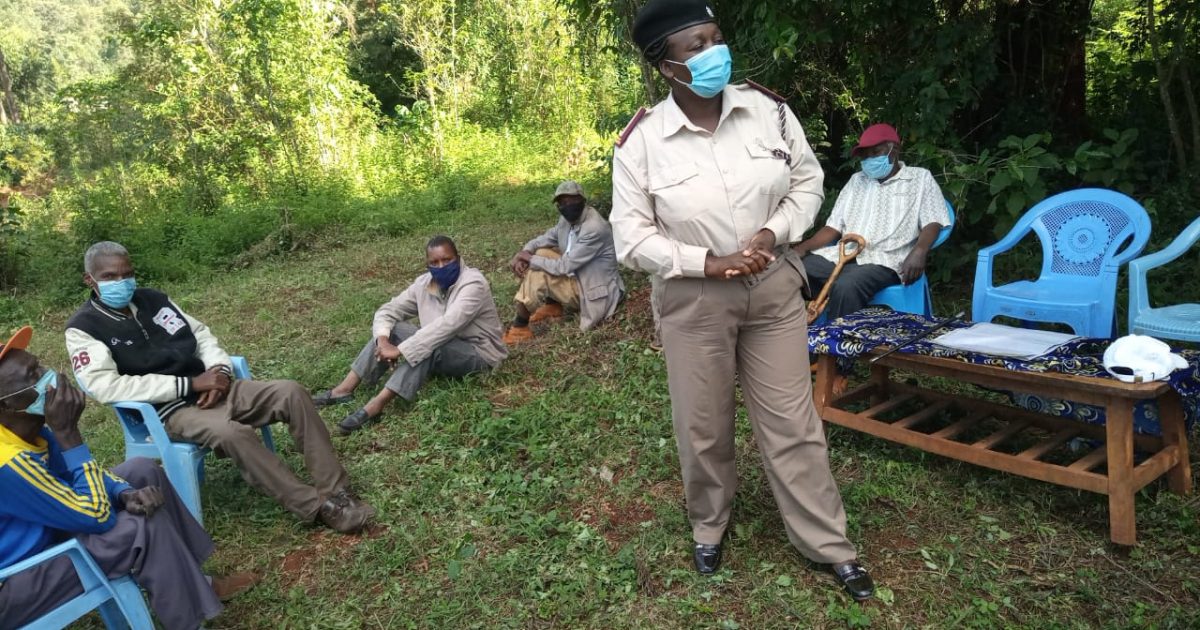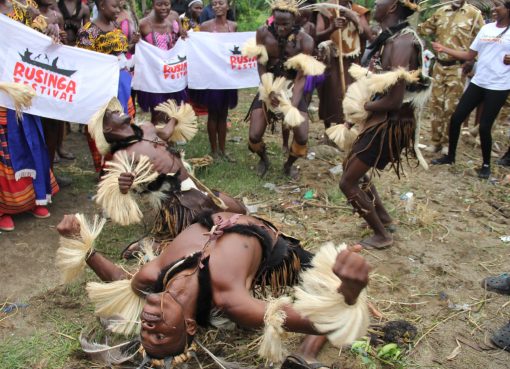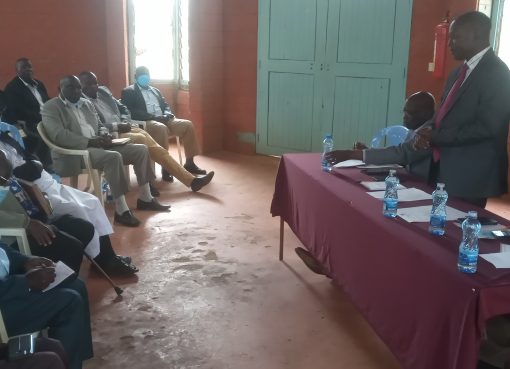A day in the life of Mrs.Videlis Wanja Kagari, Chief of Mutati location of Kiamwangi Division in the Kiambu county can be long and eventful at times.
She is, after all, the eyes and ears of the National government, overseeing its development agenda at the very grassroot level where she interacts with the common man.
At 46-year chief Kagari has seen it all and like any other administrator she has mastered the art of spearheading development activities within areas of her jurisdiction using the bottom up approach.
she has been instrumental in mobilizing the locals to pull together for growth and prosperity by bringing everyone on board the train of socio-economic transformation.
in collaboration with her assistants Chief Kagari works with the, Nyumba Kumi officials to bring all government services closer to the people.
Perhaps it is such participatory approach that could unlock needed individual and social transformation to all youth communities in Kenya and Africa.
Being the first ever female Chief in Mutati location of Kiamwangi ward, Kiambu county Kagari has blended perfectly with the community and
she told KNA in an exclusive interview that,” its easy to conclude that the prevalence of anti-social and other deterrence to economic transformation in our villages and other localities lies, not necessarily at the top, but it is on the hands of pro-active grassroots leaders who are entrusted with overseeing government programs at this lowest level of governance.”
She says the presence of the local chief is no small deal. It comes with far-reaching influence for good over individuals, families and societies especially in this era of devotion.
A wife and mother of three two boys and a girl Wanja started he career as an administrator at a her youthful stage when her passion and vision to uplift the community were interwoven.
Some of the challenges she faced was the reality of a bulging unemployed youthful population that has resorted to all sorts of means to make ends meet during these harsh economic times.
Ironically unlike in the past she says the youth are more aggressive but lack the means to unleash their potentials leading many to resort to social vices like drugs and alcohol out of desperation.
Chief Kagari, regrets that the breakdown of the old traditional order, absence of mentors and consistent father figures now weighs heavily on her even as she wrestles with rampant administrative challenges associated with both the young and the old.
Wanja sees this as something that God took time to prepare her for. Her life experience resonates well with her community and its young people that she is influencing and impacting for governance and development.
Like many in her age group, she has schooled locally and is proud of having benefitted from local resources as opposed to people who opted to go abroad for studies.
Wanja went to college and exuded great hope of excelling and getting a decent job before settling down for marriage, a dream that she says almost went up in smoke.
In what looked like an anti climax, Chief Wanja was to lose hope of ever joining her favourite dream KMTC college, to study nursing despite the fact that she had attained the requisite qualifications.
Striped of all hope after turning up and failing to succeed in some four interviews, she sought solace in joining the order of the sisters of mercy, in the miguta apostolate in Githunguri sub-county.
Upon enrolment, she was to discover that sisterhood and full-time reclusion was not her thing.
Destiny was catching up with her and she left a year later.
She feels that young people need to be patient with themselves and parents to avoid losing their focus and vision.
Lady luck seemed to smile on her, or so she thought, for shortly afterwards, she joined the Nairobi technical college to pursue the course of her dream, nursing, which, as fate would have it, was not on offer in that year, contrary to what was then indicated in her admission letter.
She was given an alternative to pursue Analytical Chemistry which she pursued and graduated with a diploma some four years later.
She at this juncture appeals to all young people, impressing upon them that life is no straight line, and that they need to often bend with the wind, pick opportunities that present themselves while diligently working towards their future.
Her Diploma in Analytical Chemistry opened up further opportunities as she got employed in different schools, as a laboratory technician.
These opportunities, she believes, opened up on her because she took time to volunteer especially at St. Francis girls’ high school, at Mang’u.
As a volunteer, she survived on parental and sibling support, until she got noticed and employed later in Nembu and later, Gitamaiyu secondary school.
Local youths, especially the educated but unemployed, find great inspiration whenever she finds time to address or mentor them for they see her as a beacon of hope in a sea of despair where hundreds of young people continue to self destruction through depression or drug abuse partly occasioned by dwindling opportunities.
Chief Wanja’s sojourn in the Miguta sisters of mercy mission, she says, instilled in her the passion to reach out and serve the less fortunate.
On her second attempt of applying to become an administrator, she, among many others, was invited for an interview after which she was informed of her success.
She qualified and was employed to replace the retiring and veteran local chief,Thiongo Kanjigi,whose shoes she thought too big to fit, considering the reputation of strict enforcement of the law that the retiring chief was leaving behind.
Together with her team of administrators that currently includes three assistant chiefs and police officers, she has been championing government agenda which includes enforcing security, policies on education, the COVID-19, youth mentorship and mobilization for vocational training among others. Her office literally sees her work closely with religious, political and other leaders to bring development closer to the people.
She was on the news sometimes last year when her vehicle, a probox, KBS 835H was stolen. She has also participated in an agricultural training at the Waturu farm in Ng’enda.
The fact that the vehicle was stolen when she was on duty, with security officers and senior leaders present opened her eyes to the problem of insecurity that daily antagonizes both the poor and rich, and the need to face it head on wherever it rears its ugly head.
Wanja’s concern as an administrator and parent is evident as she appeals to parents to cooperate with the government to help curb delinquency and insecurity by going back to the basics of the once effective traditional method of parenting.
She says few options remain in rescuing the boychild from the fatal plunge of destruction through drug abuse, suicide and crime occasioned by inability to go past basic primary education.
Chief Wanja is concerned that parents have left their children to grow up as they want, without counsel or steadying hand.
She is of the opinion that the law of the land needs to be strictly enforced to ensure the well being of the young, old and entire society.
To save the young generation from the home front, Chief Wanja says deeper intimacy and diplomacy between children and parents is paramount.
Modern technology, she says, must not be left to destroy a whole generation because the same technology can be made to work positively, for the good of the family and society at large.
She sees parents as valuable cogs of mentorship and national development and impresses on them to work at being flexible with their children by befriending, delegating and opening dialogue channels.
She advocates a win-win approach to forestall the rampart falling away and divisions prevailing in family unit.
On educational and other infrastructural development, she says the government has done its best to open up th business, educational enrolment and transition to secondary and higher institutions of learning.
She says the national government has spearheaded an impressive electricity connectivity program to all homes and institutions.
Security, she says, has bee n boosted by increased patrols, intelligence gathering and the impressive Nyumba kumi initiative especially during the just ended festive season, to both deter and apprehend culprits and suspects for tranquillity.
On the Corona menace, her area of jurisdiction has strictly been enforcing the MOH directives without leaving anything to chance.
This, she says, will continue in line with government policy because people have to be protected.
As a mother who must nurture the good and the bad, Chief Wanja has had her share of challenges.
She has had to take a tough stand on delinquent youths and others whose resistance to change has been a course for concern in her society.
She has had to reach out to local political leaders and people of goodwill for educational support for bright children from vulnerable backgrounds.
These leaders, she says, have brought a positive contribution to education, a thing that has seen local schools post an improvement in all district and county ranking.
The timely and positive contribution by the leaders, she says, has excited and inspired the children, and their parents.
The improved enrolment and transition to schools has seen the government increase funding for boarding and other facilities in places such as Kiamwangi and Nembu secondary, Gatitu mixed and St, Claire among others.
Much work remains to be done to enhance the transition to vocational and higher institutions of learning in order to increase opportunities for the young people.
It is no small thing, observes the Chief of Mutati location in Gatundu South district of Kiambu county, that the office of the President is represented in every corner of the republic by the office of the chief.
She sees this as an out-stretched hand and opportunity for development towards every individual and society.
She signs out by urging Mutati location and all citizens to equally respond, partner, network and consult with the administration in order to grow our economy.
This bottom-up approach from the chief’s office, enhances and builds up the momentum of development while rooting out all undesirables such as insecurity, negative extremism and other vices that hinder progress.
The mother who administratively nurtures the good and the not so good maintains she is a wife and mother, to her beloved husband, and children at home.
Her final cry and appeal as a mother are that Mutati and Gatundu South diaspora and all professionals turn back in droves, as individuals and groups, to hold the hands and mentor their young villagers, one by one, if only to move them to the next level.
Greatness, she affirms, is about availing one’s hand and shoulder to supplement government efforts so that those who are developmentally crawling can rise to their full potential for they too will live to lift others, and their communities.
by Lydia shiloya and S.N.Njuguna.





